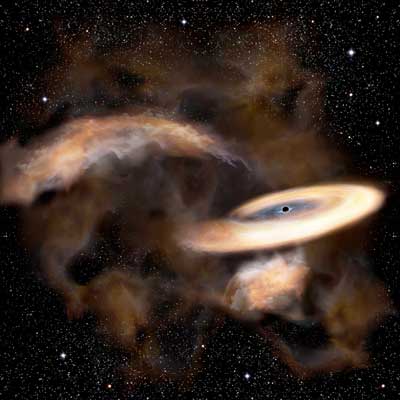| Feb 28, 2019 |
Hiding black hole found
|
|
(Nanowerk News) Astronomers have detected a stealthy black hole from its effects on an interstellar gas cloud. This intermediate mass black hole is one of over 100 million quiet black holes expected to be lurking in our Galaxy.
|
|
These results (Astrophysical Journal Letters, "Indication of Another Intermediate-mass Black Hole in the Galactic Center") provide a new method to search for other hidden black holes and help us understand the growth and evolution of black holes.
|
 |
| Artist’s impression of a gas cloud swirling around a black hole. (Image: NAOJ)
|
|
Black holes are objects with such strong gravity that everything, including light, is sucked in and cannot escape. Because black holes do not emit light, astronomers must infer their existence from the effects their gravity produces in other objects.
|
|
Black holes range in mass from about 5 times the mass of the Sun to supermassive black holes millions of times the mass of the Sun. Astronomers think that small black holes merge and gradually grow into large ones, but no one had ever found an intermediate mass black hole, hundreds or thousands of times the mass of the Sun.
|
|
A research team led by Shunya Takekawa at the National Astronomical Observatory of Japan noticed HCN–0.009–0.044, a gas cloud moving strangely near the center of the Galaxy 25,000 light-years away from Earth in the constellation Sagittarius. They used ALMA (Atacama Large Millimeter/submillimeter Array) to perform high resolution observations of the cloud and found that it is swirling around an invisible massive object.
|
|
Takekawa explains, “Detailed kinematic analyses revealed that an enormous mass, 30,000 times that of the Sun, was concentrated in a region much smaller than our Solar System. This and the lack of any observed object at that location strongly suggests an intermediate-mass black hole. By analyzing other anomalous clouds, we hope to expose other quiet black holes.”
|
|
Tomoharu Oka, a professor at Keio University and coleader of the team, adds, “It is significant that this intermediate mass black hole was found only 20 light-years from the supermassive black hole at the Galactic center. In the future, it will fall into the supermassive black hole; much like gas is currently falling into it. This supports the merger model of black hole growth.”
|

